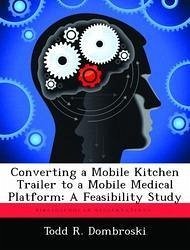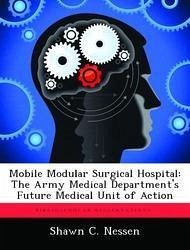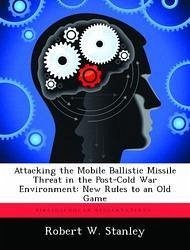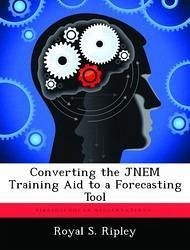Nicht lieferbar

Converting a Mobile Kitchen Trailer to a Mobile Medical Platform: A Feasibility Study
Versandkostenfrei!
Nicht lieferbar
In the near future, it appears that the missions of the U.S. Army in combat and noncombat roles will rely more on mobility. Many combat units have been able to field more modem tanks, and fighting vehicles making them more mobile. However, many medical supporting units have not modernized their ground vehicles. This is due in part to a lack of funding for medical vehicle modernization. More mobility may only be a part of the problem of medical support. The ability to haul more medical supplies, and to setup and tear-down quickly are factors in the mobility of medical support. Given the recent ...
In the near future, it appears that the missions of the U.S. Army in combat and noncombat roles will rely more on mobility. Many combat units have been able to field more modem tanks, and fighting vehicles making them more mobile. However, many medical supporting units have not modernized their ground vehicles. This is due in part to a lack of funding for medical vehicle modernization. More mobility may only be a part of the problem of medical support. The ability to haul more medical supplies, and to setup and tear-down quickly are factors in the mobility of medical support. Given the recent medical budget trends, adapting a piece of existing U.S. Army equipment for medical use could be a low cost solution. This study sampled current doctrine, after action reports, and near future predictions, in order to delineate requirements for medical support. Then current capabilities were sampled to establish medical support capabilities. This review noted medical mobility as a possible shortfall for medical support. This study proposed the idea that a U.S. Army Mobile Kitchen Trailer could be easily modified into a mobile medical platform. This platform could be configured into an operating room, pre-op/post-op room or emergency room. This adaptation was compared to the existing tent set-up of a Forward Army Surgical Team (FST), and a battalion aid station. Further comparison was made between two other mobile tent systems called a DRASH and an ASSTC for fielding with the FST. This study used the Military Decision Making Process to make feasibility (comparison) statements. This study concluded that the adaptation of an Army Mobile Kitchen Trailer was a more feasible solution for the near future requirements to improve the mobility of medical support units. This work has been selected by scholars as being culturally important, and is part of the knowledge base of civilization as we know it. This work was reproduced from the original artifact, and remains as true to the original work as possible. Therefore, you will see the original copyright references, library stamps (as most of these works have been housed in our most important libraries around the world), and other notations in the work. This work is in the public domain in the United States of America, and possibly other nations. Within the United States, you may freely copy and distribute this work, as no entity (individual or corporate) has a copyright on the body of the work. As a reproduction of a historical artifact, this work may contain missing or blurred pages, poor pictures, errant marks, etc. Scholars believe, and we concur, that this work is important enough to be preserved, reproduced, and made generally available to the public. We appreciate your support of the preservation process, and thank you for being an important part of keeping this knowledge alive and relevant.










